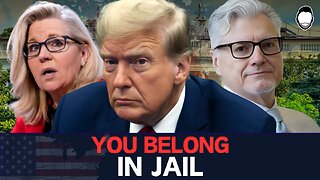Premium Only Content

Mahto Tribal Council 12-16-24
Quick recap
The meeting covered a wide range of topics related to Native American rights, treaties, and sovereignty. The Chief discussed historical treaties, the actions of the Bar Association and foreign corporate agents, and the need for establishing Mahto villages and courts. He also addressed issues of citizenship, the influence of foreign entities on U.S. governance, and the implications of the Indian Reorganization Act, while emphasizing the importance of understanding and enforcing treaty rights.
Next steps
Chief Mahto to send demand for specific performance on treaty obligations and legal notice to relevant authorities.
Chief Mahto to finalize and send adoption record document to appropriate parties.
Chief Mahto to complete and submit writ of quo warranto to U.S. Marshals.
Albert to adjust the meeting calendar for future Mahto tribe meetings.
Chief Mahto to prepare for Monday meetings to discuss tribe business and updates.
Chief Mahto to continue developing Mahto village and tribal governance structures.
Chief Mahto to pursue legal actions against those who defame or mischaracterize the Mahto tribe.
Summary
Historical Sioux-United States Treaty Discussion
In the meeting, Chief discussed the historical treaty between the Sioux and Oglala bands of Sioux Indians and the United States. He highlighted the importance of the treaty in maintaining peace and friendship between the two parties, and how it was intended to prevent private revenge or retaliation for injuries done by individuals. Chief also pointed out that the treaty guaranteed indemnification for any stolen property from the Sioux Indians. He ended the conversation by asking what the Sioux Indians gave up in exchange for the treaty, emphasizing the importance of understanding the historical context of the treaty.
Chief's Concerns and Jurisdictional Issues
The Chief discussed the improper actions of the Bar Association and the foreign corporate agents operating in their territories. He expressed concern over the violation of the Second Amendment and the refusal of authorities to return his weapons. The Chief also mentioned his plans to modify a document to be delivered to the proper authorities, focusing on the jurisdiction of the Lands Department of Pierce County and the United States Parks Department. He emphasized the importance of the international trespass and fee schedule and the responsibility of the State of Washington for the 100 acres per day. The Chief also discussed the jurisdiction of the Mahto Nation and the rights of indigenous peoples. He concluded by stating that he would no longer consent to arm foreigners operating Admiralty law within any established Mahto village or territory for public safety until his weapons are returned.
Chief's Frustration and Authority Challenges
Chief expressed his frustration with the lack of authority to arrest foreigners who refuse to follow the law and his desire to establish Mahto villages to provide services to US citizens. He criticized the Bar Association members and their courts, accusing them of human trafficking and hate crimes. Chief also questioned the loyalty of military members to the Republic or a foreign corporate entity. He emphasized the need for the establishment of their own courts and the right to try foreigners who violate their laws. Chief also discussed the importance of treaty performance and the need for the US to correct errors against Indians. He ended by challenging the authority of the US Marshals and the Department of Justice to stop their actions.
1825 Treaty, 4th Amendment, and US Citizenship
The discussion revolved around the historical context and implications of the 1825 Treaty with the Boons. The Chief emphasized the importance of understanding the 4th Amendment and the supremacy of the United States in regulating trade and intercourse with the tribes. He also highlighted the role of the 14th Amendment in defining US citizenship. The Chief questioned why the US government was unable to enforce the rights of Native Americans in the Black Hills of South Dakota, suggesting that the lack of understanding of the treaty's principles was a significant factor. He also touched on the case of John Peter Zenger, a newspaper publisher who was acquitted of slander charges, to illustrate the importance of a jury system and the protection against double jeopardy.
Foreign Influence on US Governance
The Chief discussed the history of the United States, focusing on the influence of foreign entities, particularly Britain and the Vatican, on the country's governance. He highlighted the transition from organic government to corporate law, and the subsequent exploitation of American citizens. The Chief also touched on the role of corporate attorneys and the CIA in shaping the country's policies. He concluded by suggesting that the insurance industry, particularly the policyholders, benefit from the deaths of soldiers in wars. The Chief also mentioned his efforts to correct military records to avoid being enlisted again.
1934 Indian Reorganization Act Implications
Chief discussed the history and implications of the 1934 Indian Reorganization Act, which he believes led to apartheid-like conditions within the tribes. He argued that the Act's adoption of blood quantum requirements for tribal membership was a more insidious form of discrimination than the color-based apartheid in Africa. Chief also criticized the child support system, suggesting it was a form of child and human trafficking disguised as law. He emphasized the importance of understanding the treaties and the sovereignty of the tribes, and questioned the presence of Vatican law in the United States. He concluded by expressing concern about the lack of clarity in the legal system and the potential for exploitation of vulnerable individuals.
Lien Recording, Treaty Performance, Adoption
In the meeting, Chief discussed the process of lien recording and the importance of specific treaty performance. He also shared a document he created, which included an autographed copy of an adoption record. The adoption record was significant as it allowed the Chief to adopt individuals into the Mahto tribe, providing them protection under the tribe's laws. The Chief also mentioned the importance of honoring fallen warriors and their offspring, and the custom of displaying a special Mahto logo on their apparel. The conversation ended with the Chief sharing a document he created, which included a demand for specific treaty performance.
Mahto Tribe Membership and Meetings
In the meeting, Chief discussed the Mahto tribe's membership criteria, which includes law-abiding political activists, certain prisoners, whistleblowers, and leaders. He also mentioned that non-violent offenders convicted of statutory crimes are eligible for membership. Chief emphasized the importance of due process and the right to defend oneself in the tribe's court. He also discussed the tribe's seal and the invocation of the Fort Laramie Treaty and the Constitution for the Republic of the United States. The possibility of holding weekly meetings was discussed, with Chief suggesting Mondays and Fridays. Albert agreed to adjust the calendar accordingly.
-
 1:58:40
1:58:40
Robert Gouveia
5 hours agoJ6 Coverup: Prosecute LIZ CHENEY; NY Judge REJECTS Immunity; Trump Breaks Gag?
74.8K42 -
 2:22:06
2:22:06
WeAreChange
4 hours agoPSYOP Spreads: Drones Shut Down Airport In New York!
39.5K16 -
 1:31:18
1:31:18
Redacted News
6 hours agoEMERGENCY! NATO AND CIA ASSASSINATE TOP RUSSIAN GENERAL, PUTIN VOWS IMMEDIATE RETALIATION | Redacted
197K242 -
 56:45
56:45
VSiNLive
5 hours ago $4.64 earnedFollow the Money with Mitch Moss & Pauly Howard | Hour 1
59.2K2 -
 52:44
52:44
Candace Show Podcast
5 hours agoMy Conversation with Only Fans Model Lilly Phillips | Candace Ep 122
63K244 -
 LIVE
LIVE
tacetmort3m
6 hours ago🔴 LIVE - RELIC HUNTING CONTINUES - INDIANA JONES AND THE GREAT CIRCLE - PART 5
224 watching -
 26:52
26:52
Silver Dragons
4 hours agoCoin Appraisal GONE WRONG - Can I Finally Fool the Coin Experts?
23.5K2 -
 UPCOMING
UPCOMING
Bare Knuckle Fighting Championship
10 hours agoBKFC on DAZN HOLLYWOOD WARREN vs RICHMAN WEIGH IN
16K -
 6:49:16
6:49:16
StoneMountain64
8 hours agoNew PISTOL meta is here?
31.2K1 -
 20:58
20:58
Goose Pimples
10 hours ago7 Ghost Videos SO SCARY You’ll Want a Priest on Speed Dial
16K3